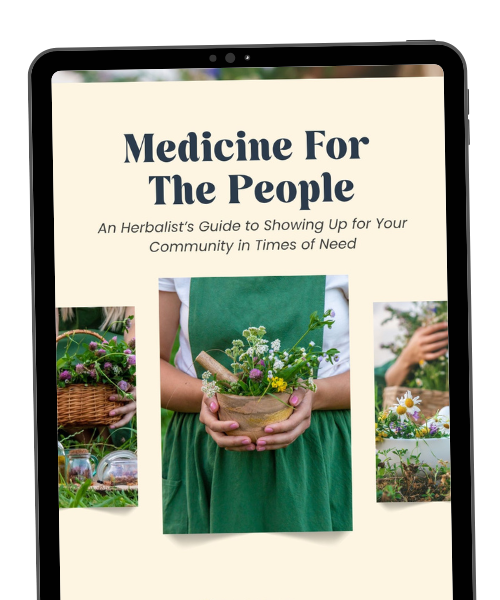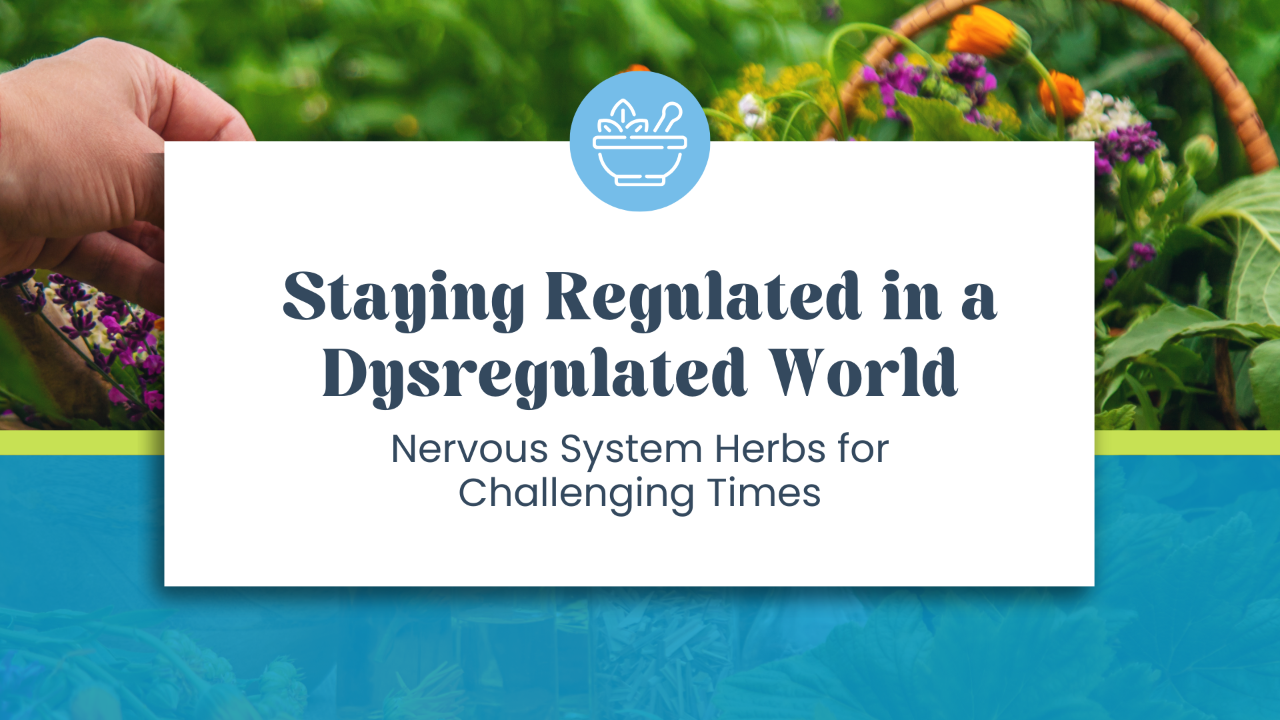Herbs to Rev Your Digestive Fire!

Why warm digestion? Well, one, it’s winter, and it’s cold! If you’re someone who is always piling on scarves and sweaters and your fingers and toes are cold, you may want to consider these herbs that can help warm your digestion.
To ensure healthy and optimal digestion, we‘ve got to support our digestive ‘fire’. This fire (called Agni in Ayurveda) is all about the power of our digestive organs' to process and absorb what we eat while also burning off waste products. When we have a strong digestive fire, we are able to easily digest food and absorb its nutrients. If we have a weak digestive fire, our body won’t digest food well, leaving undigested particles behind that create inflammation in the body.
This Inflammation can show up as:
- Hunger
- Bloating
- Indigestion
- Intestinal cramps
- Constipation
- Gassiness
- Slow digestion
- Heaviness after a meal
- Sluggish bowels
- Bulky stool
- Feeling cold
- Sweet craving
- Stimulant craving
Whereas when you have a healthy digestive fire, you can improve:
- Nutrient Absorption
- Assimilation
- Metabolism
- Digestion
- Perception
- Taste
- Touch
- Hearing
- Vitality
- Clarity
- Alertness
- Regular appetite
Having a healthy digestive fire can result in not only better digestive function, but also sense perception, cellular metabolism, and mental assimilation, which is a clear link to mental well-being and digestive health. It gives immunity, a sparkle in the eyes, and luster to the skin. When Agni is balanced, it causes emotions that are beneficial to health: courage, cheerfulness, and lucid intelligence. When Agni is out of balance it causes emotions that are destructive to health: fear, anger, confusion, and idiocy.
Another way of talking about this is known as Dysbiosis, which is an imbalance in the microbiome of your gut and can show up as frequent gas or bloating. You may feel bloated on most days of the week. You could also suffer from abdominal cramping, diarrhea, and constipation, with mucus in the stool.
But, there are a host of herbs that can help you warm up that digestion, get those toes and fingers warmed up, and help keep you and your body in balance.
Garlic ~ Allium sativum
A great herb/food to consider when dealing with dysbiosis. It’s specific when dealing with damp or cold conditions in the intestine such as abdominal bloating and pain, flatulence, loose, or mucousy stool, or even cold fingers and toes or your extremities. It can be beneficial for those suffering from gastritis, or even when food poisoning is an issue. It can be helpful f you have food stagnation, showing up as belching, flatulence, indigestion, or abdominal bloating.
Garlic has a great way of being able to help rebalance the microflora of your gut, it can kill off fungal candida strains, reduce intestinal putrefaction, and promote normal digestive activity.
For intestinal dysbiosis, try a fermentation of garlic. You can also eat raw garlic, but I like to infuse it into some local raw honey so the heat of the garlic isn’t so incredibly potent as you swallow it down. Start by getting a clove a day into your body, then try to work your way up to 3 cloves of raw garlic a day. With garlic warming, immune-stimulating, antibacterial, antimicrobial, anti-fungal, antiviral, anti-parasitic, and its a huge host of other medicinal benefits, I feel like the saying should have been… "A garlic clove a day keeps the doctor away!" It can cause excessive gassiness for those with very sensitive stomachs and when intestinal dysbiosis is present.
Horseradish Root ~ Cochlearia Armoracia L.
Another common culinary plant that can absolutely be used as medicine is horseradish. It is specific for those dealing with chronic Gastroenteritis and mucous colitis.
Horseradish can also help those dealing with:
- Consistent chills
- Appetite loss
- Chronic loose stools
- Bloating
- Nausea
- Flatulence
- Indigestion
- Bad breath
Horseradish has a great ability to stimulate digestion and clear chronic intestinal dysbiosis. It’s antiseptic and analgesic, or pain relieving actions, mean that it can help relieve or clear chronic infection, inflammation and pain. If your food is stuck and you’re suffering from abdominal bloating, or intestinal dysbiosis, horseradish is again your friend.
Try bringing it on board in a Fire Cider Recipe, as it's commonly known to be one of the best menstruum for horseradish, plus it has a host of other gut lovin’ benefits to it as well. You could also ferment it with some garlic. Consider adding it to your brassica family foods like cabbage or even some burdock root in this for its inulin rich properties and other benefits it provides for your body. Horseradish is best when used fresh. You can make it into a tincture, or an overnight cold water infusion of the root. If you can handle some fresh horseradish root juice, it’s known to be incredibly effective.
Do be cautious when dealing with horseradish as it is very hot. When overused, it can irritate your kidneys and gut mucosa. Also, it is not to be used in pregnancy or in cases of thyroid deficiency. If you begin experiencing diarrhea or night sweats, quit taking horseradish as medicine.
Black Pepper ~ Piper nigrum
Black pepper is a small fruit of a tropical east Asian vine from the monsoon forests of the South Indian Malabar coast. It’s deeply warming and cold clearing. It can help ease bloating and does a great job of warming the stomach and intestines as it promotes healthy digestion.

Ginger ~ Zingiber officinale
Ginger is native to southeastern Asia, India, and China where it is used heavily as part of the diet in each of those cultures. It has been used as medicine for centuries and was mentioned in the writings of Confucius from around 500 BCE. Ginger is a very pungent and hot herb that also acts as an appetite stimulant, as well as a carminative so it can help to alleviate tummy upset and gassiness. You can take ginger as a tincture; I love to use fresh root as a nice warming tea, and of course, you can cook so many amazing dishes with it! It’s another herb that can go really well in fermentations too.
Cardamom ~ Elettaria cardamomum
Originally from the rain forests of Sri Lanka, cardamom is considered the “Queen of Spices'' in Indian and Middle Eastern Cultures. It’s also important in Ayurvedic, Greek, and Chinese medicine. I love cardamom because it’s delicious and such a lovely warming herb to add to your foods. It's somewhat bitter and sweet as well.
It warms your stomach and intestines, promotes digestion, relieves bloating, and resolves gastrointestinal dysbiosis, it’s specific for helping to reduce allergies and food intolerances, and leaky gut. It can work wonders in helping to settle your stomach, and even stop vomiting when needed.
So, for those that are experiencing nausea, vomiting, abdominal pain, chills, heartburn, dyspepsia, and acute gastritis, adding a bit of cardamom into your life can help immensely.
I use cardamom in my Chaga Chai blend partially because it's so yummy, but also because it’s great for warming you up from the inside out. It’s also really nice to help restore the nerves, particularly for those that suffer from nervous exhaustion, depression, fatigue, brain fog, and poor memory, and it just helps to lift the mind and relieve depression, which I think so many of us could use these days. And you know what, I like to make people happy with the products I bring to you! So, if you haven’t tried my Chag Chai yet, please do! It’s definitely a chai of a different category.
You can make a decoction of the cardamom pods by gently crushing them and then simmering them for at least 10 minutes with the lid on. You can also use cardamom as a tincture.
Cinnamon ~ Cinnamomum cassia
Another favorite of mine in the culinary world, I love to add cinnamon to teas, as well as to my morning coffee. It’s a great one to warm you up from the inside out, as it’s a circulatory stimulant and will bring blood to the extremities keeping you nice and toasty.
It helps to resolve intestinal dysbiosis, as well as relieve stomach pain, as it warms the stomach and the intestines and even helps to reduce blood sugar.
It's specifically for those dealing with appetite loss, as well as those that have loose stools with undigested foods. Or those that suffer from colic and abdominal distension or when you're so bloated you don’t know what's going on. Cinnamon can provide a bit of relief there, but be wary of the underlying causes and symptoms of what’s happening.
You can also use it as a tincture, or make your own decoction of it. The powder of cinnamon taken internally, or as a decoction is the most effective way of taking it when you’re using it for intestinal issues. As with most warming and hot herbs use caution and be conscious of how it's affecting you and your unique body. It is not recommended to be taken medicinally during pregnancy or nursing.

If you’re intrigued by these warming herbs for your gut health, join me in our Facebook group where I’ll be doing live classes 2x per week, and you can ask me questions and we can hang out! Let’s make Herbalism #SpreadLikeWildFlowers
Looking for more help with your digestive health?
Resources
The Energetics of Western Herbs by Peter Holmes
Medical Herbalism: The Science and Practice of Herbal Medicine by David Hoffman, FNIMH, AHG
Practices and principles of Phytotherapy by Kerry Bone & Simon Mills
Do You Have The Right Remedies On Hand?
Whether it’s a tummy ache, sleepless nights, or boosting immunity, The Ultimate Guide to Stocking Your Natural Medicine Cabinet has the top-quality remedies you need. Tested by a clinical herbalist—and her kid too!
Grab your guide below👇🏼
We hate SPAM. We will never sell your information, for any reason.







